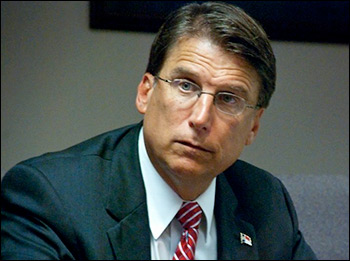
Former Gov. Pat McCrory (R-NC) – on thin ice in Senate bid? / Photo by Hal Goodtree, Flickr
Jan. 17, 2022 — The North Carolina Senate candidates have dealt with more uncertainty than any other set of statewide political contenders in this election cycle. Some of the questions have now been answered, but others remain.
Due to the continuing congressional and state legislative redistricting legal battles that have hampered the state for virtually the entire preceding decade, even the candidate filing date and the primary schedule itself were in doubt until the courts finally set a political calendar.
In order to be more relevant for the 2020 presidential election, the legislature moved the state’s traditional May primary to early March to better influence the presidential nomination selection. By not taking action to move the primary back to May, it appeared that voters would choose their ’22 nominees on March 8.
In December, the state Supreme Court, after an early flurry of lower court redistricting action, took it upon themselves to transfer the state primary to May 17. They merely suspended the Dec. 17 candidate filing deadline, but did not issue a new date. Earlier this week, as part of its ruling upholding the GOP legislature’s congressional and legislative maps, the special three-judge panel assigned to hear the redistricting challenges set the filing deadline for March 4.
With these basic questions now answered, the candidates finally have a clear electoral timeline in which to work. With the Democrats earlier coming together on a consensus candidate, fireworks are beginning on the Republican side. In mid-December, state Sen. Jeff Jackson (D-Charlotte), thought to be a major US Senate contender, dropped his statewide bid. This makes former state Supreme Court Chief Justice Cheri Beasley an overwhelming favorite for the Democratic nomination.
In the past few days, a pair of Tar Heel State Republican primary Senate polls were released almost simultaneously, with both finding former Gov. Pat McCrory holding an edge over US Rep. Ted Budd (R-Advance). The ex-state chief executive’s advantage isn’t what one would expect for a well known party leader before his own partisan electorate, however. The McCrory campaign released their Strategic Partners Solutions survey (Jan. 5; 800 likely North Carolina Republican primary voters) that gives their man a 30-21-8 percent lead over Rep. Budd and former US Rep. Mark Walker.
The Civitas Institute’s latest Cygnal statewide poll (Jan. 7-9; 600 likely North Carolina Republican primary voters) also found McCrory holding an initial lead, but only through a 24-19 percent spread. Pushing for a decision from the 48 percent who said they were undecided and adding those preferences to the total actually finds Rep. Budd pulling into a small lead, 34-33 percent, when accounting for those who have “definitely” and “probably” made up their minds.
Additionally, former President Donald Trump’s endorsement of Budd is another net positive for the congressman with 49.9 percent responding that they would either likely or probably vote for the Trump-endorsed candidate as compared to only 10.1 percent saying they would likely or probably vote against that individual.
Even while leading in the polling, McCrory barely reaching 30 percent preference means that 70 percent of the queried Republican voters are refusing to commit to him, an unenviable position. Therefore, the early polling matrix suggests that Rep. Budd has a favorable opportunity to convert more of the non-McCrory voters.
Since the ex-governor’s name is virtually universally known within the Republican electorate, one can conclude that an overwhelming percentage of them cast previous votes for him on at least one, and likely several occasions. The data suggesting that such a large percentage not choosing him now indicates that the vast majority of this representative sample cell probably won’t vote for him on primary election day.
Another unanswered question is whether Walker will leave the race and enter the new open 7th District congressional campaign. Rep. Walker was elected to the House in 2014 from the Greensboro-anchored 6th District. Before the 2020 election, the state Supreme Court, with then-Chief Justice Beasley presiding, enacted a third new congressional map for the 10-year period, and this version changed Rep. Walker’s safe Republican seat into one that would easily elect a Democrat. Seeing he couldn’t win, Rep. Walker decided not to seek re-election.
The new congressional map largely restores the Republican Greensboro district, and Walker would be a leading candidate, if not the favorite, were he to enter the new 7th CD campaign. He has not ruled out doing so, and part of the reason revolved around when the candidate filing deadline and primary would be scheduled.
With these crucial dates now known and Walker continuing to languish in polling, we may well see him switch races before the candidate filing period closes. Should Walker depart, it is believed Rep. Budd would be in the better position to capture the majority of the former congressman’s Senate support base largely for the same reason the undecideds should be more likely to also break for him; that is, they already know McCrory and are not yet supporting him.
This week’s campaign finance disclosure filings will tell us more about this Republican nomination contest. We can count on the North Carolina Republican primary being one of the most important in the nation with regard to setting the stage for determining Senate majority status in 2023.
